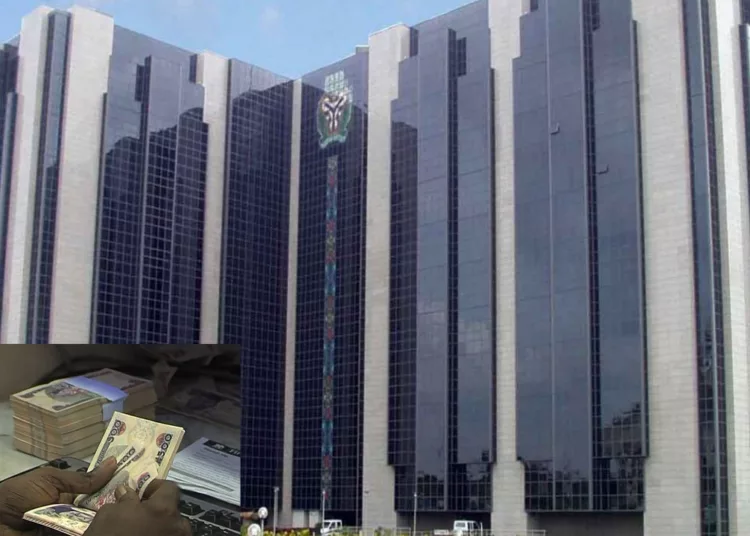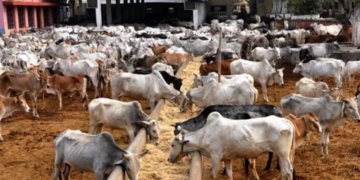According to the second quarter Economic Report of the Central Bank of Nigeria (CBN), the country’s inability to meet its revenue target pushed budget deficit from N3.88 trillion to N4.5 trillion in the second quarter of 2024, despite earning more compared to 2023.
The report revealed that revenue inflows rose in the first three months of 2024, with higher collections from petroleum profit taxes (PPT), royalties, independent federal revenues, and taxes on oil-producing companies. There was also a boost in tax collections, especially, from VAT and customs duties.
“At N6.28 trillion, provisional gross federation account receipt was 26.37 per cent above the level in Q1 2024. Higher receipts from royalties, PPT, and upstream company income tax (CIT) resulted in a 13.23 per cent increase in oil revenue to N1.73 trillion, relative to the first quarter of the year.
“Non-oil revenue, at N4.55 trillion, was 32.22 and 23.07 per cent above the levels in the preceding quarter and the target, respectively. The increase was driven, largely, by higher collections from independent revenue of the FGN, VAT and customs & excise duties,” the report stated.
Despite this inflow boost, oil revenue still missed Nigeria’s quarterly targets by a striking 67.30 per cent, based on the budget framework. Overall, revenue in the first quarter was 30.17 per cent below the benchmark used for budget planning.
Brenton woods institutions had continually canvased for the Nigerian government to focus more on generating more revenue internally.
International Monetary Fund (IMF) had advised the country to work towards making tax systems more efficient, equitable, and progressive.
IMF’s Fiscal Affairs Department director, Davide Furceri, recently emphasised the need for Nigeria and other Sub-Saharan African countries to prioritise revenue mobilization strategies to close their widening fiscal gaps.l
He pointed out that many countries, including Nigeria, suffered from extremely low revenue-to-Gross Domestic Product (GDP) ratios, with Nigeria’s just at 10 per cent. He stressed that this hampered the government’s ability to invest in development and manage debt sustainably.
Furceri explained, “Revenue mobilisation is essential, and it should focus on making the tax system more efficient, equitable, and progressive. Policies that broaden the tax base and reduce informalities can go a long way in addressing these challenges.”
To address the revenue challenge, the Bola Ahmed Tinubu led government had presented before the National Assembly, a Tax Bill that according to the chairman of the Presidential Fiscal Policy and Tax Reforms Committee, Taiwo Oyedele, will see the tax revenue of the country double over the next three years.
Oyedele noted that the reforms would lead revenue to ‘double within the next two to three years’ as a share of gross domestic product, saying ‘if we are moving from nine per cent to 18 per cent, that means we are doubling it.’
The bill, presented by the Presidential Committee on Fiscal and Tax Reforms, led by Taiwo Oyedele, proposes several key changes which include a gradual increase in Value Added Tax (VAT) from 7.5 per cent to 15 per cent by 2030 and an adjustment in Company Income Tax, which would set a rate of 27.5 per cent for large companies, reducing to 25 per cent by 2026.
Additionally, the bill proposes a four per cent development levy on companies to fund the Student Education Loan Fund for 2025 and 2026, three per cent from 2027 to 2029, and two per cent from 2030 onwards. The Bill also proposed a five per cent excise duty on sectors such as lottery, gaming, and telecommunications.
Also contained in the bill is the provision for certain supplies to be exempt from the proposed VAT. exempted supplies include: oil and gas exports, crude petroleum oil, and feed gas. Other exempt items are: goods purchased for humanitarian projects (where the donor pays VAT upfront), baby products, locally manufactured sanitary products, military hardware and arms, and ammunition supplied to security agencies.
Also, electricity generated by generation companies (GENCOs) and supplied to the national grid or to the Nigeria Bulk Electricity Trading Company (NBET) are to be exempt, along with electricity transmitted by the Transmission Company of Nigeria (TCN) to electricity distribution companies (DISCOs).
However, while many had commended the bill, there has been voices that found the bill wanting.
Recently, the National Economic Council (NEC) comprising the 36 state Governors and chaired by Vice President Kashim Shettima had recommended the withdrawal of the Tax Reforms Bill currently before the National Assembly.
Governor Seyi Makinde of Oyo State explained that the NEC recognised the need for alignment among stakeholders regarding the proposed tax reforms. Whilst stressing the importance of broader consultation and consensus-building, Makinde noted that the council acknowledged the country’s underperformance in key revenue sources and considered a report from the Presidential Committee on Fiscal Policy and Tax Reforms focused on fair taxation, responsible borrowing, and sustainable spending.
The Coalition of Arewa Groups, comprising 300 organisations from Nigeria’s 19 northern states, had thrown its weight behind the bill urging the National Assembly to pass the Nigeria Tax Bill 2024 without delay to enable swift implementation of the reforms.
According to the group, the Nigeria Tax Bill 2024 will foster economic development, enhance revenue generation, and promote Nigeria’s growth. “Our support for the tax bills is grounded in our conviction that they will ultimately benefit the Nigerian people.
“Furthermore, we acknowledge the importance of transparency in the tax system. The bill’s provisions for price transparency and monitoring of publication costs and fees are particularly noteworthy. This level of transparency will contribute to establishing fair and reasonable prices for publishing services.”





